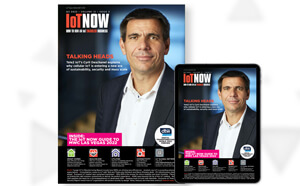Sukamal Banerjee is corporate vice president and head of the IoT WoRKS business unit at HCL Technologies. Here, he tells IoT Now that, as organisations turn to IoT platforms they are finding ways to generate sustainable business value from their IoT adoptions.
IoT Now: How can organisations generate sustainable business value through IoT adoption?
Sukamal Banerjee: Many enterprises have now started on their IoT journey, but most of them are yet to move towards transformative enterprise-level IoT strategy. The key to unlocking sustainable business value is to have intense focus on business outcomes – a move towards an outcome driven mindset. There are several low hanging fruits especially around operational efficiency and effectiveness. For example, in the manufacturing industry, the cost of downtime is sometimes as high as $22,000 per minute. If organisations embrace IoT and move from reactive maintenance to predictive maintenance, the overall organisational efficiency will improve returns on capital assets. There are several productivity efficiencies in large complex manufacturing plants if the right parts and right tools can be made available at the right time and thus improve both on inventory and also improve order-to-remittance (OTR) resulting in improved customer satisfaction (CSAT).

An IoT platform is
central to creating
transformative
impact for
organisations
Similarly for energy companies, moving from model driven grid management to Active Grid management can bring considerable value to the organisation. To achieve transformations such as this, the key isn’t just to stay focused on IoT-isation of the asset – but to ensure that the entire business process and application systems are mapped end-to-end to ensure the change management has an enterprise level impact. We have delivered sustainable business value for our customers and believe the true potential of IoT can be realised by starting now. For a Fortune 500 Global Office Automation Player, we facilitated auto replenishment of consumables by connecting 15,000 photocopiers with 10,000 customers on a single platform that lead to US$1bn of additional revenues over five years.
IoT Now: Please can you detail what IoT WoRKS is and what investments have been made in it to create an end-to-end solution for clients?
SB: IoT WoRKS is the IoT business unit of HCL Technologies which enables organisations to use best–in–class IoT solutions for maximising returns from their asset investments and create entirely new services that deliver measurable business outcomes. IoT WoRKS offers end-to-end IoT services for organisations – across the three phases of define, build and run – to help design enterprise IoT programmes, develop and implement IoT systems for realizing business value. Recognised as a market leader in IoT by four leading analyst firms – IDC, Everest Group, HfS and Zinnov – IoT WoRKS continues to strengthen its leadership position in fast growing global IoT services market. To enable end-to-end solutions for our customers, we have aligned our focus and solutions. Our focus is on bringing innovative solutions and services along the asset value chain of enterprise customers in four key industries – manufacturing, life sciences and healthcare, energy and utilities and transport and logistics Our solutions approach is aligned to core areas of asset value chain: • Force – Connected User • Asset – Connected Products • Site – Connected Infrastructure • Transform – Connected Operations In support of this, we’ve made investments in our ecosystem with joint propositions with leading and niche partners, such as Microsoft, IBM and Intel, in our solutions and our people and competency.
IoT Now: What does the term IoT platform mean to HCL and what are the benefits?
SB: An IoT platform is central to creating transformative impact for organisations. An IoT-enabled solution that touches all aspects – things, data, processes and people – of a business problem and is built on following three cornerstones will lead to a successful IoT platform strategy. A platform should: • Enable faster business decision making with high performance data management analytics • Increase speed of innovation by being agile and scalable • Build a service-oriented system with pervasive security capabilities In terms of benefits, IoT platforms create untapped revenue streams, reduce costs, and increase operational efficiencies, enhancing the overall customer experience.
IoT Now: What regions do you see as an important hub for IoT for manufacturing organisations?
SB: Europe leads in terms of Industrial IoT (IIoT) for manufacturing. However, there are very heavy investments planned in several leading organisations in US and some parts of APAC.
IoT Now: What do you see as the success factors for an IoT platform?
SB: Any successful IoT platform needs to address the complete end-to-end stack of thing, data, process and people, that makes up a business challenge and provide a cohesive solution that is scalable and secure. This need to address the full stack has been highlighted in a recent global IoT Survey (view survey at: wwwhcltech.com/iot-survey) of 260 decision makers conducted for IoT WoRKS by research firm Vanson. The survey asked respondents to detail the most important attributes for an ideal IoT platform and found that 95% of respondents require their IoT platform to include security, 89% require data analytics, 89% also require endto-end support, 86% require scalability and agility, and 83% require interoperability. HCL has also recently launched a new global IoT survey of 263 key decision makers, the findings will be available at www.hcltech.com/iot.






